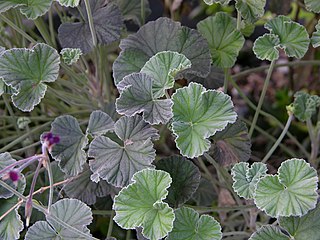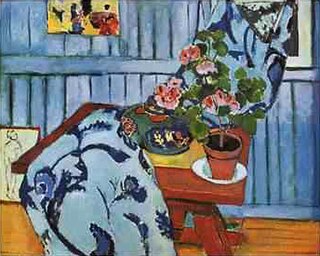
Geranium is a genus of 422 species of annual, biennial, and perennial plants that are commonly known as geraniums or cranesbills. They are found throughout the temperate regions of the world and the mountains of the tropics, with the greatest diversity in the eastern part of the Mediterranean region.

Pelargonium is a genus of flowering plants that includes about 280 species of perennials, succulents, and shrubs, commonly called geraniums, pelargoniums, or storksbills. Geranium is also the botanical name and common name of a separate genus of related plants, also known as cranesbills. Both genera belong to the family Geraniaceae. Carl Linnaeus originally included all the species in one genus, Geranium, and they were later separated into two genera by Charles Louis L'Héritier de Brutelle in 1789.

Geraniol is a monoterpenoid and an alcohol. It is the primary component of citronella oil and is a primary component of rose oil and palmarosa oil. It is a colorless oil, although commercial samples can appear yellow. It has low solubility in water, but it is soluble in common organic solvents. The functional group derived from geraniol is called geranyl.

Pelargonium sidoides is a plant native to South Africa, Eswatini, and Lesotho. Its common names include African geranium and South African geranium. The current conservation status is Least concern.

Geranium dissectum or cut-leaved crane's-bill is a plant species of the genus Geranium. It is native to Europe.

Still Life with Geraniums is a 1910 oil on canvas painting by Henri Matisse.
Masters of the Sea is a 1922 Austrian silent adventure film directed by Alexander Korda and starring Victor Varconi, María Corda and Tibor Lubinszky.

The Unknown Tomorrow is a 1923 German silent drama film directed by Alexander Korda and starring Werner Krauss, María Corda, and Olga Limburg.
Everybody's Woman is a 1924 Austrian silent drama film directed by Alexander Korda and starring María Corda, May Hanbury, and Jeffrey Bernard. A Montmartre flower-seller is transformed into a society lady for a bet. It is also known as The Folly of Doubt.

Tragedy in the House of Habsburg is a 1924 German silent historical film directed by Alexander Korda and starring María Corda, Kálmán Zátony and Emil Fenyvessy. The film recounts the events of the 1889 Mayerling Incident in which the heir to the Austro-Hungarian Empire committed suicide. Interior filming was done at the Johannisthal Studios in Berlin with location shooting in Vienna. The film cost $80,000 to make, but only earned back around half of this at the box office.

Dancing Mad is a 1925 German silent comedy film directed by Alexander Korda and starring Victor Varconi, María Corda and Willy Fritsch. It based on the French play Le Danseur de Madame by Paul Armont and Jacques Bousquet. A free-spirited young wife flirts with an old flame, before finally settling down in her marriage.

Madame Wants No Children is a 1926 German silent drama film directed by Alexander Korda and starring María Corda, Harry Liedtke and Maria Paudler. It is based on the novel Madame ne veut pas d'enfants by the French writer Clément Vautel. The film was made for the American Fox Film Corporation's German subsidiary. The film was shot at Tempelhof Studios in late 1926. It was the last European film Korda made until 1930 as he left for the United States shortly after its production.
White Rose is a 1919 Hungarian silent drama film directed by Alexander Korda and starring María Corda, Gyula Bartos, and Emil Fenyvessy. It was based on an 1853 novel by Mór Jókai. It was released by the state-owned Hungarian film industry during the Hungarian Soviet Republic, although production had begun before the regime came to power. Korda went on to make two further films for the Soviet government Yamata and Ave Caesar! which led to his eventual arrest once the regime had been overthrown and his ultimate decision to leave Hungary for Austria.
Neither at Home or Abroad is a 1919 Hungarian silent drama film directed by Alexander Korda and starring Lajos Ujváry, Hermin Haraszti and María Corda. Its title is also often translated as Neither In Nor Out.
Number 111 is a 1919 Hungarian silent thriller film directed by Alexander Korda and starring Gábor Rajnay, María Corda and Gyula Bartos. The film was based on a novel by Jenő Heltai. It was Korda's final Hungarian film before he went into exile in Austria during the White Terror. The film was remade in 1938.

Love and the Devil is a 1929 American sound drama film directed by Alexander Korda and starring Milton Sills, María Corda and Ben Bard. While the film has no audible dialog, it was released with a synchronized musical score with sound effects using the sound-on-disc Vitaphone process.
Ave Caesar! is a 1919 Hungarian drama film directed by Alexander Korda and starring Oscar Beregi Sr., María Corda and Gábor Rajnay. A debauched Habsburg Prince sends out one of his aide-de-camps to bring him back a gypsy girl. The film was considered as an attack on the aristocracy. It was made by Korda for the state-owned film industry during the Hungarian Soviet Republic. Once the regime fell later that year Korda was arrested and eventually compelled to leave Hungary as part of the White Terror.

Coniothyrium is a genus of fungi in the family Coniothyriaceae. The genus was circumscribed by Czech mycologist August Carl Joseph Corda in 1840. It was formerly placed in the Phaeosphaeriaceae family until 1983 when the family was established.

2-Oxoquazepam is a benzodiazepine derivative and one of the major active metabolites of quazepam (Doral).
Stjepan Čordaš is a Croatian football manager and former player.











